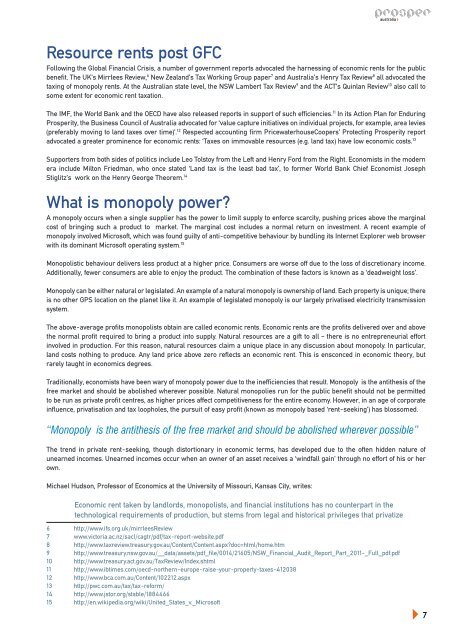TOTAL RESOURCE RENTS OF AUSTRALIA
Create successful ePaper yourself
Turn your PDF publications into a flip-book with our unique Google optimized e-Paper software.
Resource rents post GFC<br />
Following the Global Financial Crisis, a number of government reports advocated the harnessing of economic rents for the public<br />
benefit. The UK’s Mirrlees Review, 6 New Zealand’s Tax Working Group paper 7 and Australia’s Henry Tax Review 8 all advocated the<br />
taxing of monopoly rents. At the Australian state level, the NSW Lambert Tax Review 9 and the ACT’s Quinlan Review 10 also call to<br />
some extent for economic rent taxation.<br />
The IMF, the World Bank and the OECD have also released reports in support of such efficiencies. 11 In its Action Plan for Enduring<br />
Prosperity, the Business Council of Australia advocated for ‘value capture initiatives on individual projects, for example, area levies<br />
(preferably moving to land taxes over time)’. 12 Respected accounting firm PricewaterhouseCoopers’ Protecting Prosperity report<br />
advocated a greater prominence for economic rents: ‘Taxes on immovable resources (e.g. land tax) have low economic costs. 13<br />
Supporters from both sides of politics include Leo Tolstoy from the Left and Henry Ford from the Right. Economists in the modern<br />
era include Milton Friedman, who once stated ‘Land tax is the least bad tax’, to former World Bank Chief Economist Joseph<br />
Stiglitz’s work on the Henry George Theorem. 14<br />
What is monopoly power?<br />
A monopoly occurs when a single supplier has the power to limit supply to enforce scarcity, pushing prices above the marginal<br />
cost of bringing such a product to market. The marginal cost includes a normal return on investment. A recent example of<br />
monopoly involved Microsoft, which was found guilty of anti-competitive behaviour by bundling its Internet Explorer web browser<br />
with its dominant Microsoft operating system. 15<br />
Monopolistic behaviour delivers less product at a higher price. Consumers are worse off due to the loss of discretionary income.<br />
Additionally, fewer consumers are able to enjoy the product. The combination of these factors is known as a ‘deadweight loss’.<br />
Monopoly can be either natural or legislated. An example of a natural monopoly is ownership of land. Each property is unique; there<br />
is no other GPS location on the planet like it. An example of legislated monopoly is our largely privatised electricity transmission<br />
system.<br />
The above-average profits monopolists obtain are called economic rents. Economic rents are the profits delivered over and above<br />
the normal profit required to bring a product into supply. Natural resources are a gift to all – there is no entrepreneurial effort<br />
involved in production. For this reason, natural resources claim a unique place in any discussion about monopoly. In particular,<br />
land costs nothing to produce. Any land price above zero reflects an economic rent. This is ensconced in economic theory, but<br />
rarely taught in economics degrees.<br />
Traditionally, economists have been wary of monopoly power due to the inefficiencies that result. Monopoly is the antithesis of the<br />
free market and should be abolished wherever possible. Natural monopolies run for the public benefit should not be permitted<br />
to be run as private profit centres, as higher prices affect competitiveness for the entire economy. However, in an age of corporate<br />
influence, privatisation and tax loopholes, the pursuit of easy profit (known as monopoly based ‘rent-seeking’) has blossomed.<br />
“Monopoly is the antithesis of the free market and should be abolished wherever possible”<br />
The trend in private rent-seeking, though distortionary in economic terms, has developed due to the often hidden nature of<br />
unearned incomes. Unearned incomes occur when an owner of an asset receives a ‘windfall gain’ through no effort of his or her<br />
own.<br />
Michael Hudson, Professor of Economics at the University of Missouri, Kansas City, writes:<br />
Economic rent taken by landlords, monopolists, and financial institutions has no counterpart in the<br />
technological requirements of production, but stems from legal and historical privileges that privatize<br />
6 http://www.ifs.org.uk/mirrleesReview<br />
7 www.victoria.ac.nz/sacl/cagtr/pdf/tax-report-website.pdf<br />
8 http://www.taxreview.treasury.gov.au/Content/Content.aspx?doc=html/home.htm<br />
9 http://www.treasury.nsw.gov.au/__data/assets/pdf_file/0014/21605/NSW_Financial_Audit_Report_Part_2011-_Full_pdf.pdf<br />
10 http://www.treasury.act.gov.au/TaxReview/Index.shtml<br />
11 http://www.ibtimes.com/oecd-northern-europe-raise-your-property-taxes-412038<br />
12 http://www.bca.com.au/Content/102212.aspx<br />
13 http://pwc.com.au/tax/tax-reform/<br />
14 http://www.jstor.org/stable/1884466<br />
15 http://en.wikipedia.org/wiki/United_States_v._Microsoft<br />
7



